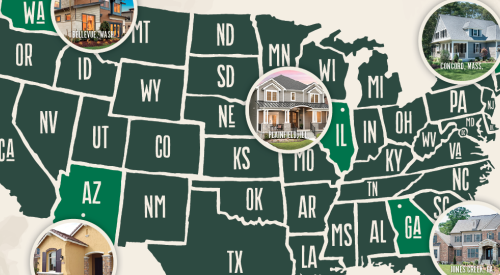At the end of 2016, Chicagoland home sales dropped sharply. In October there were 8,762 closed home sales, a 6.3 percent decrease from October of 2015 and lowest October sales in the last five years. Although 2016 was a record year for home buying in Chicago overall—the largest on record since 2006—the end-of-year decline in home buying may be carrying over into 2017 (Image: kaicho20 via Pixabay).
But why?
Supply is depleted. In December 2016, there were only 27,106 available units in the Chicagoland area. In the real estate business, this isn’t a high number, and only amounts to a 2.8-month supply, based on the average pace of home sales throughout the year.
Prices are inflated. While the distressed housing crisis has been averted, many cities, including Chicago, are experiencing a strange situation where there are few homes for sale, but due to recent renovations, their price tags are even more inflated than they would otherwise be if only due to supply and demand.
Supply is down. While many apartment dwellers move frequently, homebuyers looking for high-end condos or single family home are struggling to find homes for sale. Because competition is high in the housing market right now, many potential buyers are holding off, and possibly waiting until the perfect home comes along.
Flipping is harder. In the past, Chicago buyers were far more willing to take on the risks of buying, renovating, and flipping distressed or foreclosed homes, a trend that helped buoy home sales after the Great Recession. In 2012, sales of distressed homes in Chicago peaked at 57.8 percent of all home sales. Just four years later, as home prices increased, distressed homes accounted for just 14.4 percent of sales.
A few other factors may be prompting the price increases:
Luxury buyers want smarter homes. The Internet of Things is becoming increasingly important. Connected homes make daily life more convenient, and security systems are important to many buyers. For many, the higher-tech and more complete, the better.
Classic luxury properties can be a tough sell. The typical luxury home is grander now. But newer builds are forgoing the staircases and foyers of McMansions past, focusing on more practical spaces. Open spaces are still highly desirable, but each space must have a purpose. Some are even multi-purpose, ideal in smaller homes.
Even buyers with deeper pockets aren’t in search of enormous homes anymore; layout and use of the existing space are far important. Buyers are less looking for a home to use as a status symbol and more often looking for a space that they can entertain and live in comfortably. Often, these buildings and their amenities come at a higher price.
Location is still everything. Sought-after neighborhoods still cost more; even more when supply is short. Some 71 percent of luxury buyers would pay more to live in the neighborhood of their choosing than for any other home feature, according to the 2014 Luxury Lifestyle Report survey from Sotheby’s International Realty.
There’s a large population trying to move to the Chicago suburbs right now, where there are more homes for families. Sellers are trying to capitalize on the suburban movement and succeeding in some cases, but the astronomical costs will make many buyers’ eyes glaze over.
Whether a buyer is searching for a suburban home with a yard on a quiet street, or a row home in the Gold Coast, availability is slim. The prices of luxury condos and single-family homes simply rose too high too quickly, and most incomes have yet to catch up with the market. The median price of a single-family home in Chicagoland was $240,000 at the end of 2016. That’s a 6.7 percent increase year-over-year, compared to just 5.1 percent in U.S. cities overall. Even buyers who are financially well off are recognizing that the price tag doesn’t match the product, and are putting off buying a new home until the prices drop—or until their dream home finally comes along.











